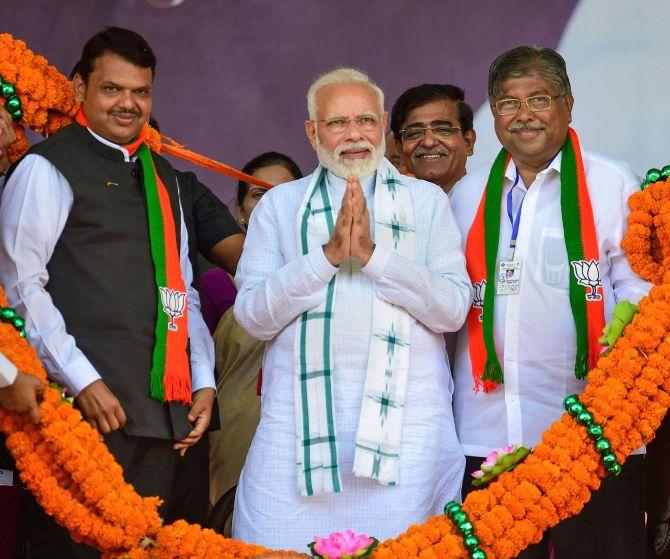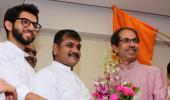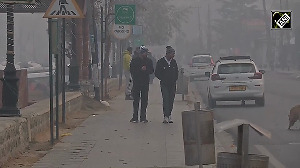The BJP has been inducting leaders from the NCP and the Congress since the last few months to expand its footprint in the regions where the party lacks organisational base.

Apart from testing the fortunes of ruling Bharatiya Janata Party and incumbent chief minister Devendra Fadnavis, the next month's assembly polls in Maharashtra pose a tough challenge to the Opposition bloc, especially to Nationalist Congress Party chief Sharad Pawar, beset with defections to the ruling camp.
The Election Commission of India on Saturday announced a single-phase poll for Maharashtra which will be held on October 21.
Counting of votes will be taken up on October 24.
This will also be the first assembly election under the Narendra Modi government and also first after the April-May Lok Sabha polls, which handed a massive mandate to the Narendra Modi government.
The BJP, led by Fadnavis, is looking to better its 2014 tally of 122 seats in the 288-member House.
With the BJP taking centrestage even in the Lok Sabha polls contested in 2014 and 2019, the Congress's hold in its strongholds of Vidarbha, Marathwada and Mumbai region has weakened.
Similarly, the NCP is struggling to retain its pocket-borough of western Maharashtra.
The Shiv Sena has retained its base in Konkan.
In a clever strategy, the BJP has been inducting leaders from the NCP and the Congress since the last few months to expand its footprint in the regions where the party lacks organisational base.
The BJP's tactic is not only proving to be psychologically advantageous for the saffron party but it is also a signal to the Uddhav Thackeray-led party to be ready to play the second fiddle in the state politics.
The BJP and the Shiv Sena are locked in a tug-of-war over sharing of the 288 seats.
Through his 'Maha Janadesh Yatra', Fadnavis travelled a distance of 4000 kms covering 140 assembly constituencies.
The yatra concluded in Nashik on September 19 in the presence of Prime Minister Narendra Modi.
For Sharad Pawar, it could be the toughest battle in his political career spanning over five decades.
It was evident from speeches of Prime Minister Narendra Modi and earlier of BJP chief Amit Shah that the BJP has been strategically attacking Pawar.
Apart from raising issues like farm loan waiver and development, indications are that the BJP would milk the withdrawal of the special status of Jammu and Kashmir under Article 370 to push its nationalist agenda.
On the other hand, the Congress and the NCP are targetting the government on agrarian distress, drought, the economic "slowdown" and "joblessness".

In 2014 polls, both the Sena-BJP and the NCP-Congress alliances ruptured ahead of elections.
After the four-way contest, the BJP emerged as the single largest party, followed by the Sena (63), the Congress (42) and the NCP (41).
The Sena later joined the government but with a bruised ego.
While the BJP and the Sena are yet to arrive at a consensus on the seat-sharing formula, the Congress and the NCP have already sealed the deal to contest 125 seats each.
The Opposition bloc will leave 38 seats for smaller allies.
As far as the Congress is concerned, the party appears rudderless in the state which once used to be its stronghold.
Many leaders of the party, including former Leader of Opposition Radhakrishna Vikhe Patil and former minister Harshvardhan Patil, have joined the BJP.
While sitting MLAs Nirmala Gavit, Bhausaheb Kambale and Abdul Sattar have joined the Shiv Sena, MLAs Kalidas Kolambkar and Jaykumar Gore have crossed over to the BJP.
Former Mumbai Congress president Kripashankar Singh, a north Indian leader who wields clout in some pockets, has also quit the party.
Though he has not opened his cards on his future political move, speculation is that he might join the BJP.
Bahujan Vikas Agadhi MLA Vilas Tare has joined the Sena.
Prominent defectors from the NCP who have switched loyalties to the BJP are former minister and Navi Mumbai strongman Ganesh Naik, who was with Pawar for at least two decades, and Udayanraje Bhosale, a direct descendant of warrior king Chhatrapati Shivaji Maharaj.
Bhosale had resigned from his Parliamentary membership from Satara in western Maharashtra before joining the BJP in Delhi in the presence of party chief and Union home minister Amit Shah.

Those from the NCP fold who have switched their allegiance to the BJP are MLAs Sandeep Naik, Vaibhav Pichad, and Rana Jagjitsinh.
Former party MPs Dhananjay Mahadik and Sanjeev Naik have also joined the BJP.
Leaders from Pawar's party who have joined the Sena are sitting MLAs Pandurang Barora, Shivendraraje Bhosale, Avdhoot Tatkare and his father and former MLC Anil Tatkare, Dilip Sopal and former state unit president Bhaskar Jadhav.
Former NCP MLAs Sachin Ahir and Madhukar Pichad, who had served as ministers in the erstwhile Democratic Front government in the state, have also joined the Sena. Both of them were considered close to Pawar.
According to a senior Congress leader, the deserters have switched sides considering local political equations, but they are not being able to dent the party's organisation at the local level.
The Congress and the NCP had been in power for three consecutive terms before they lost to the BJP in 2014.
Though the previous governments were headed by the Congress, it was the NCP which represented plum portfolios.
In contrast, incumbent CM Fadnavis is firm in saddle.
He is only the second chief minister, and first non-Congress one, to complete the full five-year term in office.
Congress' Vasantrao Naik had held the post of chief minister for eleven long years.
The Prakash Ambedkar-led Vanchit Bahujan Aghadi, comprising the All India Majlis-e-Ittehadul Muslimeen, adds another dimention to the fragmented politics of the state, which has sizable Dalit and Muslim pockets.
In the Lok Sabha polls, the VBA had played spoilsport for the candidates of the Congress and the NCP by causing division of votes, which ultimately benefitted the BJP-led National Democratic Alliance.
The Maharashtra Navnirman Sena of Raj Thackeray, which is battling for political survival, has also vowed to contest.
In Lok Sabha polls, the MNS had extended its support to the Opposition bloc.










